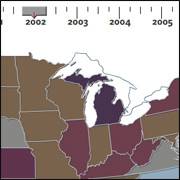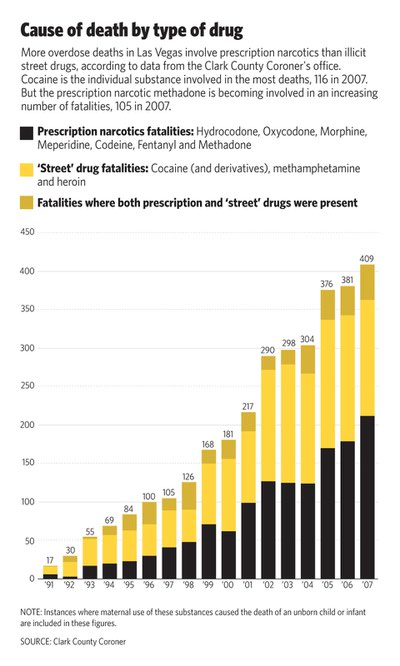State legislators and regulators Monday called the Sun’s reports about the startling rise in the use of narcotic painkillers in Nevada a wake-up call to improve patient care in the state.
Sun Series: The New Addiction
- Part 1: The painful truth about Nevada (7-6-2008)
- Part 2: Rising use of painkillers taking deadly toll (7-7-2008)
- Part 3: Officials urge action on painkiller abuse (7-8-2008)

Sun Interactive
Reader poll
“Definitely Nevada is overusing narcotics,” said Assemblywoman Sheila Leslie, D-Reno, who leads the legislative committee on health care. “How could you not come to that conclusion?”
Leslie said she will work with Nevada Attorney General Catherine Cortez Masto to draft legislation to address the issue during the 2009 legislative session.
The Sun’s analysis of Drug Enforcement Administration data showed that Nevadans are the No. 1 users of hydrocodone — the primary ingredient in the brand-name drugs Vicodin and Lortab — and ranked fourth for per capita use of methadone, morphine and oxycodone, the primary ingredient in the painkiller OxyContin.
The skyrocketing rate of narcotics use — methadone use was up 12-fold in a decade — has been accompanied by a startling trend: The number of fatal overdoses in Clark County involving narcotic painkillers is now greater than those involving street drugs and surpasses the number of people killed by firearms.
“Shocking,” Leslie said of the rising prescription drug death toll. “I don’t think that’s well-known.”
Leslie said that among the Sun’s findings, she was concerned by how just a few providers prescribe the bulk of the narcotics — and how current law limits what authorities can do about it.
The Sun’s analysis of a Nevada Pharmacy Board database that tracks prescriptions for controlled substances found that about 5 percent of providers in the database wrote about 88 percent of prescriptions in the database in 2007.
The database was created to help identify patients who might be “doctor shopping” — illegally getting overlapping and concurrent prescriptions from multiple providers to get drugs to feed an addiction or to distribute illegally. By law, the database cannot be analyzed to examine the prescribing habits of a particular doctor, dentist or other medical professional.
Leslie said she wants to explore whether the law can be changed to monitor prescribing habits.
“There has to be a way to have someone more carefully review that information,” Leslie said. “It certainly seems like we could zero in on the doctors who are overprescribers.”
Leslie said the Legislature needs to support a campaign to prevent drug abuse — it’s common for abusers to get pills that were prescribed legitimately for others — and increase resources for the treatment of addiction, the lack of which she called one of the “biggest problems in Nevada.”
“There are a lot of people using (narcotics) who know they’re in trouble and know they’re addicted but can’t get help,” Leslie said.
Cortez Masto recently expanded the mission of the state’s methamphetamine working group to include the prescription drug problem. She said Monday the group is exploring legislative changes focused on preventing abuse, providing treatment and educating the public to prevent drug abuse.
Cortez Masto said any regulatory changes must respect patients who legitimately need narcotic painkillers, while making it more difficult for drug abusers to get them from doctors or on the street. To combat methamphetamine, the state requires people sign a log to purchase cold medicines that can be used to make the illegal drug.
Dr. Edwin “Flip” Homansky, an emergency room doctor, medical director of the Valley Health System and member of the Nevada State Board of Health, said regulators and influential members of the medical community need to further examine the Sun’s findings to address the problem.
He said he was most concerned about patients who take too many narcotics to alleviate pain. “These pills aren’t the answer and can lead to more trouble,” he said.
Homansky said medical providers need to learn about the long-term consequences of prescribing narcotic painkillers, which are not effective for long-term chronic pain.
Larry Pinson, executive director of the Nevada Pharmacy Board, said it’s urgent legislators and elected officials take action to prevent excessive use of the painkillers.
“You look at these types of numbers — prescription narcotic drug overdoses rivaling automobile deaths — that’s got to be a wake-up call,” he said.
In addition to help for patients addicted to painkillers, Pinson said, there is a need for patients to be educated about the law — that pharmacists are required to speak with patients about the drugs they receive, and that pharmacists are required by law to offer free consultations.
Pinson said he’s also in favor of licensing pharmacy technicians, who can easily divert drugs, so there’s a higher threshold to cross in terms of getting the jobs and to provide accountability once they are in their positions.
Pinson said the board will resurrect a program to help patients get help for their addiction if they are discovered to be shopping for doctors to obtain multiple prescriptions for narcotic painkillers.


Join the Discussion:
Check this out for a full explanation of our conversion to the LiveFyre commenting system and instructions on how to sign up for an account.
Full comments policy